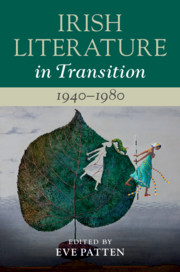Book contents
- Irish Literature in Transition, 1940–1980
- Irish Literature in Transition
- Irish Literature in Transition, 1940–1980
- Copyright page
- Contents
- Contributors
- Series Preface
- General Acknowledgements
- Introduction
- Part I After the War: Ideologies in Transition
- Part II Genres in Transition
- Chapter 5 Intermodernism and the Middlebrow in Irish Writing
- Chapter 6 Transitional Life-Writing: Frank O’Connor and the Autobiographical Tradition
- Chapter 7 ‘Somehow It Is Not the Same’: Irish Theatre and Transition
- Chapter 8 Samuel Beckett, Flann O’Brien and the Literature of Absurdity
- Part III Sex, Politics and Literary Protest
- Part IV Identities and Connections
- Part V Retrospective Frameworks: Criticism in Transition
- Index
Chapter 8 - Samuel Beckett, Flann O’Brien and the Literature of Absurdity
from Part II - Genres in Transition
Published online by Cambridge University Press: 28 February 2020
- Irish Literature in Transition, 1940–1980
- Irish Literature in Transition
- Irish Literature in Transition, 1940–1980
- Copyright page
- Contents
- Contributors
- Series Preface
- General Acknowledgements
- Introduction
- Part I After the War: Ideologies in Transition
- Part II Genres in Transition
- Chapter 5 Intermodernism and the Middlebrow in Irish Writing
- Chapter 6 Transitional Life-Writing: Frank O’Connor and the Autobiographical Tradition
- Chapter 7 ‘Somehow It Is Not the Same’: Irish Theatre and Transition
- Chapter 8 Samuel Beckett, Flann O’Brien and the Literature of Absurdity
- Part III Sex, Politics and Literary Protest
- Part IV Identities and Connections
- Part V Retrospective Frameworks: Criticism in Transition
- Index
Summary
The Irish 1950s lend themselves all too well to examination through the absurdist prism. Perhaps the most significant figure in the multilayered evolution of Irish literature in this period, Samuel Beckett offers a platform for constructions of Ireland’s ‘Continental’ affiliations, a testing-ground for theories of an Irish avant-garde and a point of resistance to categorisations of Ireland as committed to traditions of conservative domestic realism. This chapter initially reviews Beckett’s engagements with the absurd, discussing his novel Molloy and radio play All That Fall, and outlining how the absurdist paradigm became an early and influential critical response to the representation of language. Drawing connections between Beckett and his younger contemporary Flann O’Brien, particularly on the level of religion, this chapter also considers the extent to which a parallel response played out on the domestic front in the distinctive career of O’Brien. It asks to what extent an absurdist counter-ideology was played out in O’Brien’s fictional narratives and in the work of his journalistic alter ego, Myles na gCopaleen, whose column ran uninterrupted from 1940 to 1966.
- Type
- Chapter
- Information
- Irish Literature in Transition, 1940–1980 , pp. 150 - 166Publisher: Cambridge University PressPrint publication year: 2020
- 11
- Cited by

